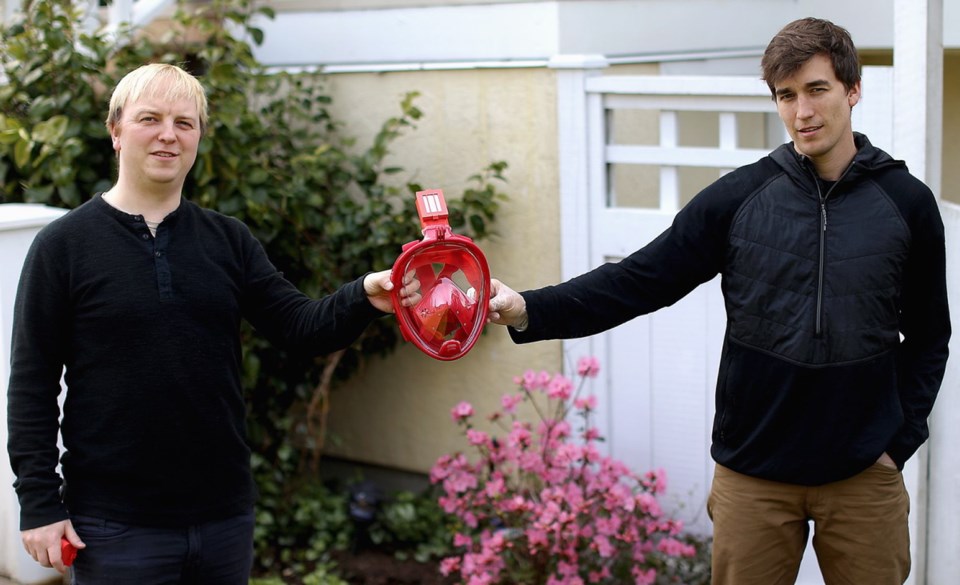Ian Mathieson spent Monday morning looking for snorkelling masks in China — though not because he wants to go swimming.
Rather, he was riding to the rescue of front-line workers at risk of COVID-19.
Mathieson and another Victoria tech guy, Philipp Hertel, have come up with a plan to convert full-face snorkelling masks for use as alternatives to the face shields and N95 masks that are in such short supply.
Good for them. And good for all the other Islanders who have taken it upon themselves to jump into the gap, turning to technology or textiles to ease the shortage of personal protective equipment.
This has been our silver lining: As grim as things are, it is gratifying to see people step up to make a difference.
Take Mathieson and Hertel. They started with the idea that there was no point in finding a solution that would further stress the health-care system’s already overstretched supply chain. Rather, they would go fishing (or diving) for answers in another pool.
They hit upon snorkelling masks — though not the ones you’re probably envisioning, with the goggles that cover your eyes and nose while you breathe through a tube that plugs straight into your mouth. The masks Mathieson and Hertel use cover the entire face, with the snorkel poking out of the top. They offer a wider view than do goggles, and allow the user to breathe through both the mouth and nose.
To convert the masks, the Victorians replaced the snorkel with a 3D-printed plastic adaptor holding a common HEPA filter. Early tests show their masks keep out airborne droplets while also allowing the wearers to breathe properly. Even if not worn in hospitals, they could be useful to firefighters or grocery clerks or others anxious for protection.
Mathieson and Hertel are now waiting for the blessing of health authorities. In the meantime, they have — thanks to supporters Tiny, the All One Fund, the Jawl Foundation, Rasool Rayani and Sparklit — arranged for the shipment from China of large quantities of masks to convert here. They have also sourced a type of HEPA filter that, again, isn’t critical to the existing supply chain, but that they say is more effective than N95 masks.
Others in Victoria have provided backing, including an organization that has offered a place to assemble the products and, critically, to mass-produce adaptors via injection molding, a much faster process than 3D printing.
It’s all being done on a non-profit basis. “Nobody’s getting paid to do anything,” Mathieson said.
Note that they are making how-to instructions available to the world at covid19emergencyfacemask.com. The site has had hits from 58 countries, and the two men have had calls from as far away as South Africa.
Now, as Mathieson and Hertel pointed out, their idea has yet to gain the stamp of approval of Island Health or any other authority. That’s typical of many of the ideas advanced by those rushing to help. While Island Health said it is “humbled by the generosity and ingenuity of everyone who has reached out,” there’s still a process to go through to ensure all health and safety standards are met.
The provincial government is definitely interested in outside assistance in easing the crunch, though. Last week it launched an online site (Google “Supply Products and Services to Support B.C.’s COVID-19 Response” to find it) at which we are asked to offer medical supplies and protective equipment.
People haven’t been shy about jumping in, whether going through officialdom (or meeting required standards) or not.
Distillers all over Vancouver Island are churning out hand sanitizer or disinfectant. Last week, the TC’s Cindy Harnett wrote of how Camosun College and Victoria-based manufacturer AP Plastics were combining to produce plastic face shields for Island Health workers.
Another local tech guy, Barnacle Systems co-founder Brandon Wright, just repurposed his office’s 3D printer to provide health care workers with what he called “ear-savers” — strips onto which wearers can the hook the elastics that hold masks in place. “We can do about 50 a day,” he said Monday, by which time deliveries had been made to cardiac nurses at Royal Jubilee Hospital, hospice workers and ER doctors.
Home crafters began producing something similar — headbands including buttons around which the elastics loop — after a Royal Jubilee worker posted online about the behind-the-ear pain that comes from wearing masks for hours at a time.
Other people are sewing cloth masks. No, they’re not a substitute for the medical-grade ones designed to protect health care workers from contracting disease, but they may prevent the wearers from spreading germs of their own.
It’s heartening, as Mathieson and Hertel can attest after seeing others step up for their project.
“People,” Hertel said, “have been absolutely amazing.”



